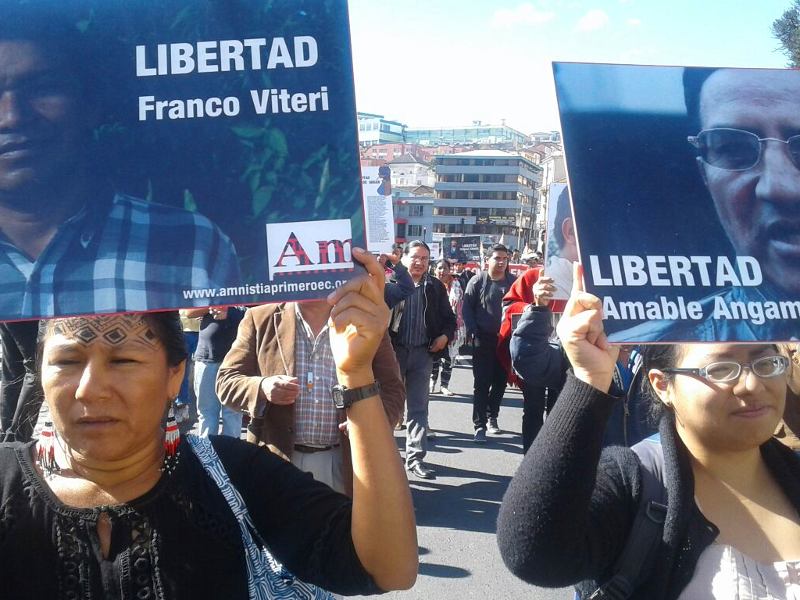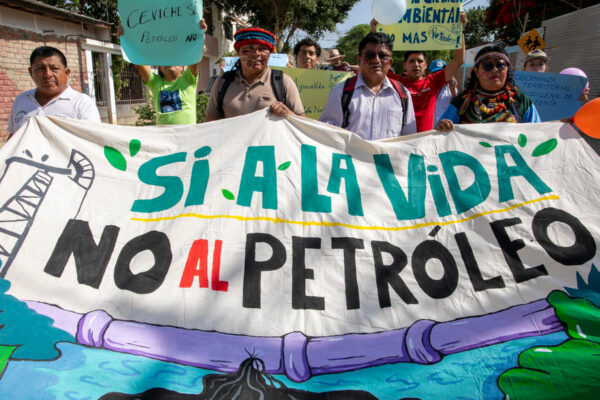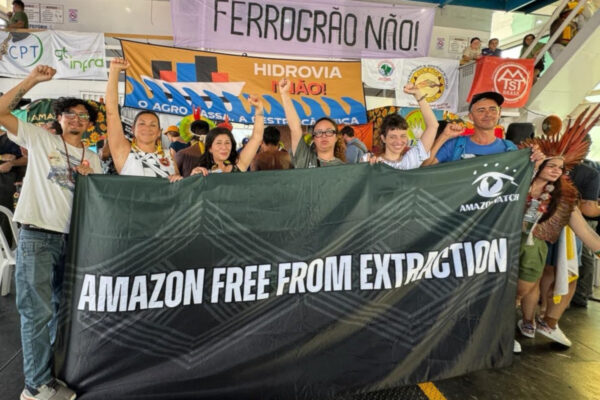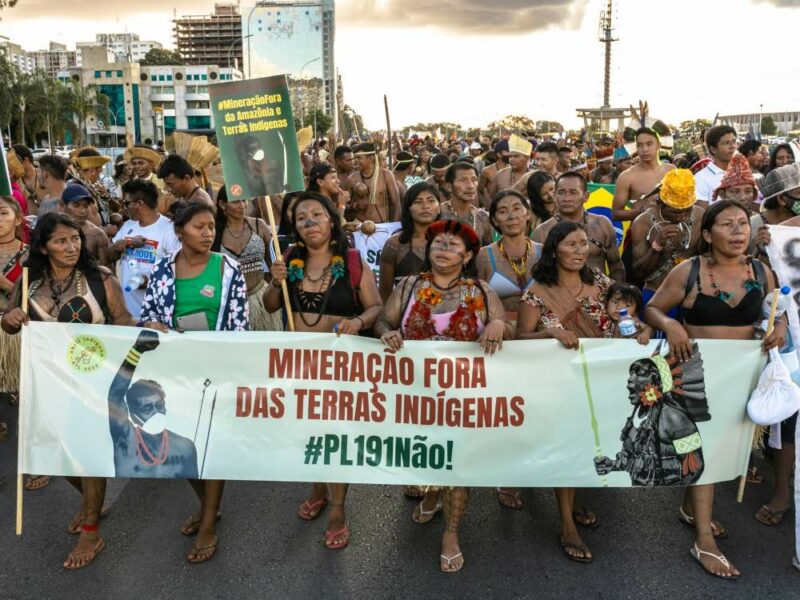
A longer version of this article appeared the Fall 2017 issue of NACLA Report on the Americas
“At the end of the day resistance is an ethical struggle. It is a struggle we must take up. Resistance is a principle of justice, especially when we see that the people are suffering.”Gustavo Castro
Berta Cáceres, assassinated in her home in March 2016, was just one of hundreds of Latin American environmental activists attacked in recent years. At least 577 environmental human rights defenders (EHRDs) were killed in Latin America between 2010 and 2015 – more than in any other region. In addition to violence, EHRDs suffer legal threats and harassment, severely impeding their work. Before Cáceres’ murder, she faced trumped-up charges due to her opposition to hydroelectric dams on her indigenous community’s territory.
Judicial-system harassment attempts to intimidate EHRDs into silence. Such criminalization transforms activism into crime to avoid bloodier tactics that tend to generate greater sympathy and public outcry. It’s an effective tool to silence activists, forcing them to devote time, energy, and financial resources to legal defense and also stigmatizing and alienating them from support networks.
Latin America’s indigenous peoples are often at the front lines of the conflict in opposition to industrial exploitation of natural resources and usurpation of traditional land tenure. EHRDs fight to protect the land, water, forests, animals, and the territorial rights of local communities to serve as stewards of those resources. They advocate and organize against large-scale mines, oil drilling, hydro-electric dams, biofuel plantations, cattle ranches, new highways and railways, logging operations, and other types of destructive industrial development.
Nearly every country in the region has ratified International Labor Organization Convention 169, which stipulates that governments consult with indigenous communities that will be affected by proposed projects on their lands and some national laws are even more stringent. Yet, in practice, such projects tend to run roughshod over community rights and interests.
When states prioritize business interests over the rights of their citizens, they tend to see them as obstacles instead of as citizens with needs.
The Legal System as a Weapon Against EHRDs
That Latin American governments readily accommodate powerful economic interests comes as no surprise to Gustavo Castro, a Mexican social-movement leader and the sole eyewitness to Cáceres’ murder. In the course of coordinating Latin American anti-mining coalitions, he often sees governments’ attempt to streamline foreign investment by modifying local laws including laws guaranteeing freedom of expression. In paving the way for free trade agreements (FTAs), governments have “expanded the concept of expropriation,” Castro argues, putting in place rules that abrogate their own sovereignty and the rights of their people in favor of of transnational companies.
As Castro explains, the cancellation of a concession can be declared an expropriation and protest a trade impediment if it impedes the flow of goods. To avoid trade disputes, governments outlaw protest and criminalize activism. “It’s cheaper for governments to throw some human rights defenders in jail than pay for those million-dollar lawsuits,” he says.
The rules imposed by the Peruvian government after the U.S.-Peru FTA and the criminalization of EHRDs that resulted illustrate Castro’s point. In 2008, the Awajún and Wampis, whose ancestral territory spans the Northern Peruvian Amazon, organized massive protests against proposed legislative decrees to make Peruvian law conform to the FTA. These decrees would have allowed companies to exploit Amazonian lands for oil, gas, mining, and logging. Protests continued through 2009, and tensions escalated into a violent confrontation with police officers in Bagua, resulting in 33 deaths.
After the Bagua massacre, 54 protesters were charged with crimes like homicide and rebellion, and the prosecutor sought the most severe penalties possible. As an example of the absurdity of the charges, the president of a national indigenous federation, AIDESEP, faced 35 years to life for “instigation,” even though he was in Lima at the time of the confrontation.
In 2016, all defendants (including one who died while on trial) were absolved of all charges. Several of the decrees they had been protesting were also deemed unconstitutional because they had not been written in consultation with indigenous communities.
The bending of government policy to industry’s needs is also clear in Ecuador, even though its former president, Rafael Correa, was generally considered a leftist. During his tenure, Correa granted numerous mining and oil concessions to foreign companies on indigenous ancestral territories and environmentally sensitive areas like the Amazon rainforest. When EHRDs and indigenous communities protested, they were stigmatized and jailed, and in some cases, their organizations were also shut down.
The case of the Shuar Arutam, detailed in a separate article in this issue by Carlos Mazabanda, exemplifies the kinds of targeting of indigenous communities that occurred under the Correa administration. At least 80 more have been indicted protesting the mine, and the National Indigenous Confederation of Ecuador (CONAIE) lists more than 200 people currently criminalized for protest in Ecuador. CONAIE’s “Amnesty First” campaign has called on the newly-elected president, Lenin Moreno, to pardon these indigenous activists before they would agree to meet with him.
Although Moreno’s governing plan states, “Nature is above the economy, [is] invaluable,” he has also made clear that he plans to continue the mega-mining projects planned or underway in high-biodiversity areas like the Cordillera del Cóndor. Paradoxically, he also promises to “re-green” the country, using revenues from oil and mining projects.
This double-speak is also evident from states that are home to companies behind many of the resource-exploitation projects being contested by Latin American EHRDs. In 2016, Lolita Chávez was invited to speak before the European Parliament about the companies operating in her region of Guatemala. “But when I spoke about hydroelectric dams, the EU wasn’t so happy.” After all, she explains, our resources also “are sought after by the world powers.”
That search for industrial development and natural resource exploitation also involves international financial institutions, both public and private.
The financier of the Peruvian Yanacocha and Conga gold mine projects, which have a long history of criminalizing local opposition, is the International Finance Corporation (IFC), the private lending arm of the World Bank. Like many extractive industry projects in Latin America, these mines, among the largest gold mines in Latin America, are a joint venture between the IFC; an American company, Newmont Mining Corporation; and a Peruvian company, Minas Buenaventura.
In one telling instance, in April 2013, local campesino leaders attended a meeting about the Conga mine organized by the regional governor. Because the location selected by the governor would not accommodate all the community members wishing to participate, the leaders asked the governor to move the meeting to the central plaza. During the meeting, community members made their rejection of the project clear, while the governor defended it. Afterward, the governor filed a criminal complaint against community members for aggravated kidnapping, alleging that he had been forced to participate in the meeting under threat of physical violence. It took nearly four years for the charges to be dismissed. As with cases of hundreds of other protesters and EHRDs facing court proceedings, a dismissal of charges indicates a political rather than evidentiary basis for the prosecutions.
Stigmatization and Defamation: A Tool to Silence
Often employed together with criminalization campaigns are efforts to stigmatize and defame EHRDs. This strategy is particularly useful when there is a paucity of evidence to support legal claims against EHRDs. If the ERHD is so demonized that she loses community support, defending herself in court becomes more difficult, as does defending herself before the court of public opinion. In many cases, government officials or companies carry out publicity campaigns to incriminate EHRDs before the justice system has examined a case, knowing the media will disseminate the stigmatizing messages.
“When the first charges began to be filed against me,” remembered Lolita Chávez in our May 2017 interview, “the media didn’t explain that I have the right to prove my innocence but rather assumed that the accusation was truthful.” Media amplification increases the emotional toll caused by false accusations. Even if the defender is not found guilty, the reputational damage can be sufficient to severely curtail, or even render impossible, future environmental defense work.
Throughout her defense of K’iche’ land rights, Chávez has received multiple death threats, survived an attempt on her life in 2012, been the object of smear campaigns, faced criminalization. “They have accused me of illicit association, of plagiarism and kidnapping, of conspiracy … for opposing multinational companies, principally mining and hydroelectric projects,” she told me. Over the years, Chávez has had to confront at least 25 legal cases against her, though it is hard to be sure of the exact number, let alone nature, of the legal complaints and charges against her because authorities do not always divulge such information. At times, she has had to file freedom of information requests to learn the details of cases pending against her.
Chávez has also been targeted in a sexualized way, as are many women EHRDs. “As women, we aren’t affected by criminalization in the same way as men,” Chávez told me. For example, “when they threaten me with going to jail, they tell me that ugly things will happen to me there. They tell me they will rape me, both on the way to the jail and once I am there.”
Chávez did not mince words when she spoke of the effects of her criminalization. “To live with false accusations is to live with constant psychological torture,” she reported. “It has affected my life, my day-to-day. I began to be seen with all those stigmas attached to me. It’s been said that I am a threat to national security. The way I was treated was exhausting and has worn down my social life, my family life, and my economic situation.”
To survive both physically and emotionally, Chávez explained, she has formed support networks with other women to provide emotional, spiritual, and organizational assistance. “Creating community is what has helped me.”
“We Will Continue Fighting”
Criminalization can, and often does, have a seriously chilling effect on the work of ERHDs across Latin America. But not always.
In northern Chiapas, the arrest of a protest organizer has inspired a movement against the federal government’s plans to auction oil concessions in an area that overlaps with Zoque ancestral territory. “The local government arrested her to silence the movement, but by doing so just created more awareness and resistance. It was the wrong move,” said a local protester.
As Gustavo Castro observed, “At the end of the day resistance is an ethical struggle. It is a struggle we must take up. Resistance is a principle of justice, especially when we see that the people are suffering.”
Lolita Chávez agreed. “We are still alive here,” she affirmed to me in May. “For as long as we continue to believe that coexistence with Mother Earth is a responsibility and a lifelong commitment, we will continue fighting. I invite all those who read this article to join with us, to create community with us. This is our hope for life.”













